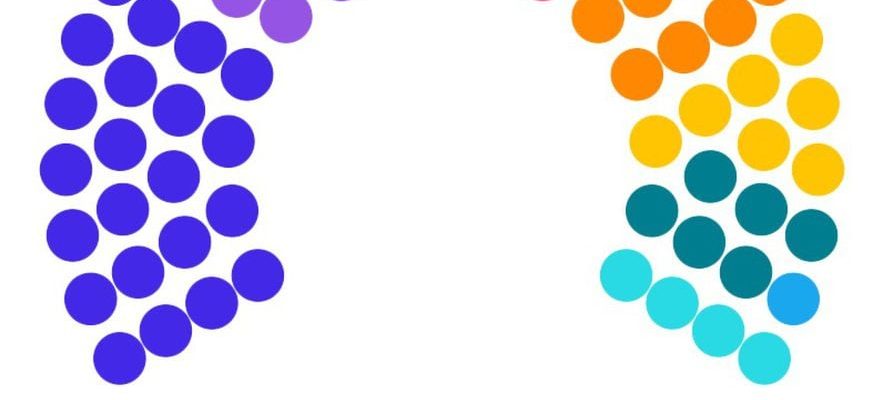While the European elections will take place on June 9, and the RN list, led by its president Jordan Bardella, appears to be the big favorite – 30% of voting intentions expressed according to an Elabe survey for The Sunday Tribune and BFMTVL’Express takes stock of the 79 French deputies who currently occupy the European Parliament since 2019.
Distribution of French MEPs.
© / The Express
Renew: 23 deputies
Liberal-centrist formation of Parliament, Renew was created on June 12, 2019, and established itself as the third political force in the European body, with 101 elected officials (more than 14% of MEPs). It is led by Frenchwoman Valérie Hayer, an early Macronist and head of the presidential party list for the next European elections. Still unknown a few weeks ago, his candidacy has long appeared as a default choice, facing an RN who seems all-powerful.
Identity and democracy: 18 deputies
In May 2019, 23 RN MEPs were elected to sit in this nationalist and far-right group, alongside parties like the Lega in Italy or the AFD in Germany. Among them is Jordan Bardella, who became vice-president of the group, and head of the RN list in the June 9 election, in which he is a big favorite.
Four MEPs from the group have since left the RN to join Eric Zemmour, during the 2022 presidential campaign: Maxette Pirkabas, Gilbert Collard, Jérôme Rivière and Nicolas Bay. The latter joined the ranks of the group of European Conservatives and Reformists, also considered far-right.
The Greens/European Free Alliance: 12 deputies
It was not until 1984 that the Greens began to coordinate their efforts at European level. In July 1999, they joined the European Free Alliance (EFA), bringing together parties campaigning for the regions’ right to self-determination. They gave birth to a new political group, the Greens/European Free Alliance, which includes 72 MEPs, of which the French delegation is the largest with 12 members.
At 36, Marie Toussaint, also unknown to the public, was chosen to lead the head of the EELV list, to the detriment of the former national secretary of the Greens David Cormand, who fell to second place on the list. She notably established herself on the activist scene with “The affair of the century” in 2019, the name given to the initiative of three environmental defense associations – including her own – which took the State to court for climate inaction.
European People’s Party (EPP): 8 deputies
Founded in 1953 (under the name of the Christian Democratic Group), the EPP has been the largest political group in terms of numbers since 1999. But its lead over the second group, the Socialists and Democrats (S&D), is eroding since 2014. In France, François-Xavier Bellamy, member of the group, is head of the list for the Republican party. His list is credited with 8% of the votes in the OpinionWay-Vae Solis barometer for The echoes, more or less the same as in the last election of 2019, which placed the right at its lowest level with only 8.4% of the vote. Nadine Morano, Brice Hortefeux and Geoffroy Didier are also members.
Progressive Alliance of Socialists and Democrats: 7 deputies
Located on the center-left of the political spectrum, the S&D group represents more than 20% of the seats with 143 MEPs, including 7 French. Raphaël Glucksmann, head of the PS list; Aurore Lalucq, former spokesperson for Génération. s, the party of Benoît Hamon; or even Pierre Larrouturou, unsuccessful candidate in the left-wing primary during the 2022 presidential elections, are among them. With 12% of voting intentions, the PS list appears in third position in the polls for the next European elections, behind the RN and the presidential party.
The Left – GUE/NGL: 6 deputies
Located on the far left of the political spectrum, the Left group occupies just over 5% of the 705 seats in the European Parliament, with 37 MEPs from 13 member states. Its co-presidency is ensured by the Frenchwoman Manon Aubry, head of the LFI list, and the German Martin Schirdewan (Die Linke). If rebellious France would have liked a single list of Nupes, in continuity with the union in the 2022 legislative elections, this alliance was refused by the PS and the environmentalists. The Insoumis assume an illiberal project “incompatible with current European rules”, and imagines convincing member states to renegotiate European treaties in accordance with its program.
